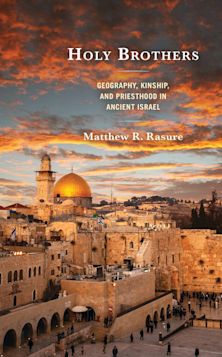A Womanist Reading of Hebrew Bible Narratives as the Politics of Belonging from an Outsider Within
A Womanist Reading of Hebrew Bible Narratives as the Politics of Belonging from an Outsider Within
This product is usually dispatched within 2-4 weeks
- Delivery and returns info
-
Flat rate of $10.00 for shipping anywhere in Australia
Description
The U.S. Declaration of Independence of 1776 decreed that all men were created equal and were endowed by their Creator with “certain unalienable Rights.” Yet, U.S.-born free and enslaved Black people were not recognized as citizens with “equal protections under the law” until the passage of the Fourteenth Amendment. Even then, White supremacists impeded the equal rights of Black people as citizens due to their beliefs in the inferiority of Black people and that America was a nation for White people. White supremacists turned to biblical passages to lend divine justification for their views. A Womanist Reading of Hebrew Bible Narratives as the Politics of Belonging from an Outsider Within analyzes select biblical narratives, including Noah’s curse in Genesis 9; Sarah and Hagar in Genesis 16 and 21; Mother in Israel in Judges 5; and Jezebel, Phoenician Princess and Queen of Israel in 1 and 2 Kings. This analysis demonstrates how these narratives were first used by ancient biblical writers to include some and exclude others as members of the nation of Israel and then appropriated by White supremacists in the antebellum era and the early twentieth century to do the same in America. The book analyzes the simultaneously intersecting and interconnecting dynamics among race, gender, class, and sexuality and biblical narratives to construct boundaries between “us versus them,” particularly the politicization of motherhood to deny certain groups’ inclusion.
Table of Contents
Abbreviations
Introduction: Womanist Biblical Interpretation and the Politics of Belonging
Chapter 1: “This Woman’s Son Shall Not Inherit with My Son”: The Politics of Motherhood in the Sarah-Hagar Narratives
Chapter 2: Outsider Within: A Vineyard, a Curse, and US Racial Politics
Chapter 3: Mammies, Jezebels, Prophetesses, and Royal Women: Symbolic Border Guards in the Deuteronomistic History
Chapter 4: Mothers in Israel, Church Mothers, and Mothers of the Nation
Chapter 5: Final Thoughts of an Academic Outsider Within
Bibliography
About the Author
Product details
| Published | 07 Jun 2024 |
|---|---|
| Format | Hardback |
| Edition | 1st |
| Extent | 180 |
| ISBN | 9781978706996 |
| Imprint | Fortress Academic |
| Dimensions | 238 x 161 mm |
| Series | Womanist Readings of Scripture |
| Publisher | Bloomsbury Publishing |
Reviews

ONLINE RESOURCES
Bloomsbury Collections
This book is available on Bloomsbury Collections where your library has access.


































